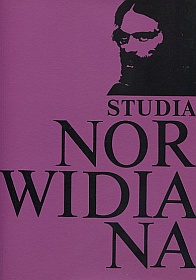Teofil Lenartowicz's Tyrteusz and Cyprian Norwid's Tyrtej Versus the Insurrection Motifs of the Polish Patriotic Songs of the Partition Era
Abstract
Generally speaking, people in Poland invoked the figure of Tyrtaeus during pro-independence risings or shortly after their fall. Norwid did the same.
Norwid saw Tyrtaeus first of all as a teacher of modern national consciousness and an awakener of socially minded imagination, and only in second place as a military leader. It was in this spirit that he translated the Greek poet's elegy. Viewed in such light, Norwid's tragedy Tyrtej represents a lesson in the modern way of thinking about the relations between the individual and society. The unfinished state of Norwid's work makes it impossible to judge where the balance of the arguments lay in the conflict between the two sides. One could agree that some features of Spartan society were reminiscent of the tsarist system. Yet one might just as well regard Norwid's Sparta as a critical depiction of the old Sarmatist Poland, the Poland of noblemen's unruliness, noblemen's bravado and... noblemen's inanity. Against such a background the idealised Athens appeared as a republic based on the popular element and proclaiming the democratic ideals of equality of all citizens and respect for God-given truths.
It is difficult to say whether Norwid knew Sen grobów, but he must have felt uneasy about that poetic apotheosis of the insurgents' martyrdom. For that reason in the same year (1865) he began to reflect critically on the ideological context of the risings, subjecting it to sharp criticism. The drama Tyrtej, together with his previously mentioned lyrical poems, mainly the ode Do spółczesnych, is the mainstay of Norwid's important and instructive teaching on modern patriotism.
Copyright (c) 1999-2000 Studia Norwidiana

This work is licensed under a Creative Commons Attribution-NonCommercial-NoDerivatives 4.0 International License.





